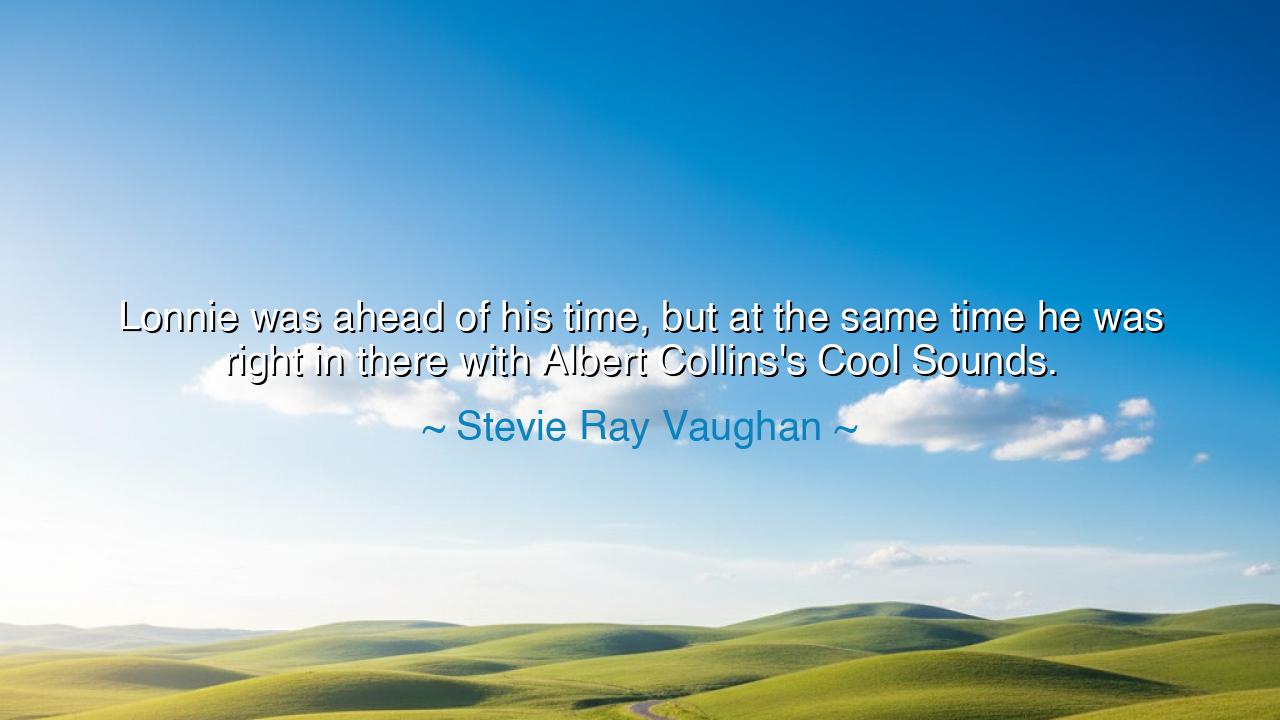
Lonnie was ahead of his time, but at the same time he was right
Lonnie was ahead of his time, but at the same time he was right in there with Albert Collins's Cool Sounds.






In the words of Stevie Ray Vaughan, we are called to understand the eternal dance between the visionary and the contemporary, the one who sees ahead and yet remains deeply rooted in the moment. His words about Lonnie convey the paradox of being ahead of one's time while simultaneously being connected to the present, embodying the timelessness of true artistry. To be “ahead of one’s time” is often seen as a gift of foresight, a trait that allows a person to shape the future, to envision paths that others cannot yet see. Yet, Lonnie was not merely distant from the present; he was immersed in it, contributing to and sharing in the musical community, where he was not alone in his innovative approach, but alongside Albert Collins, another master of the blues who brought his own cool sound into the world. This harmony of past and future is a testament to the power of the present moment—how the best of the future can arise from the deepest understanding of the now.
Consider, then, the great philosophers of the past, such as Socrates or Plato, who were known for their ability to see beyond the boundaries of their time. They were visionaries, yet they did not seek to alienate themselves from the world in which they lived. Instead, they engaged with the society around them, shaping it, challenging it, and seeking to understand it. They knew that to bring forth true change, one must first deeply understand the present, for only then could the future be shaped. Lonnie, like these great thinkers, understood the interplay between innovation and tradition. He was both ahead of his time, and yet, by his very presence and work, he was deeply embedded in the sound of the moment.
The blues, like all great art forms, is a reflection of the soul, shaped by the experiences of those who create it. Albert Collins, known for his "cool sound", was also a figure of immense influence, rooted in the traditions of the blues yet pushing the boundaries of its expression. His music spoke to the depths of the human experience—gritty, raw, and powerful. In his time, he was a revolutionary who transformed the genre while never losing sight of its roots. Stevie Ray Vaughan saw in these two men, Lonnie and Collins, not just masters of their craft, but also examples of the delicate balance between innovation and tradition. They were both leaders and students, forever entwined in the ongoing conversation of music, art, and life itself.
To see Lonnie as "ahead of his time" is to recognize the timeless nature of his contribution. He did not simply invent something new; he built upon what came before, adding his own unique voice to the melody of his era. He was a visionary, yes, but a visionary who understood that the future could not be created in isolation from the present. Much like Leonardo da Vinci, who was ahead of his time in his inventions and art, but also deeply grounded in the Renaissance world he inhabited, Lonnie saw that true greatness comes from the fusion of the past and the future. His music was not a rejection of what came before, but a continuation of it, a dialogue between the old and the new.
The lesson here, then, is one of balance—of being aware of the present while also striving to reach beyond it. To be ahead of one’s time does not mean to reject the world in which you live, but to find ways to build upon it. It is through this deep connection with the present that true innovation can occur. In our own lives, we are often faced with the desire to push forward, to break free from the constraints of the moment, to forge new paths. Yet, it is in our understanding and embrace of the now—in our engagement with the world as it is—that we find the power to transform it.
This wisdom is embodied in the story of Mahatma Gandhi, who, while advocating for an independent and modern India, never forsook the traditional values that grounded his country. Gandhi understood that true change must be built on a foundation of understanding and respect for the past. His vision for the future was not one of disruption but of evolution, an evolution that came from a deep awareness of the present struggles and triumphs of his people. In this way, he, like Lonnie and Collins, was both ahead of his time and rooted in the traditions that shaped him.
The practical action to take from this is clear: seek to balance the vision for a better future with a deep appreciation of the present. Whether in music, art, work, or life itself, true greatness is found in the ability to see what could be while honoring what is. Just as Lonnie and Collins did in their music, we, too, must find ways to innovate within the context of our lives, understanding that the future is built on the foundation of the present. Let us look not just forward, but also around us, for it is in the now that the seeds of tomorrow are sown.






AAdministratorAdministrator
Welcome, honored guests. Please leave a comment, we will respond soon